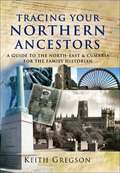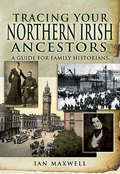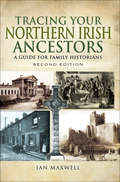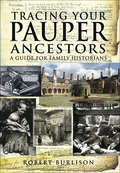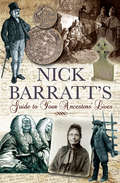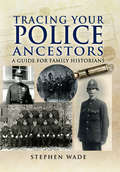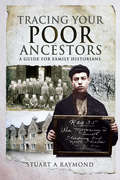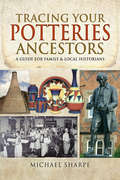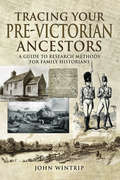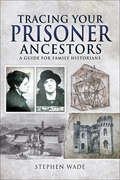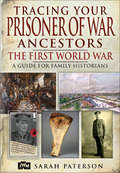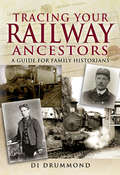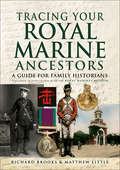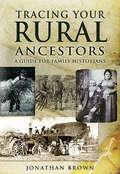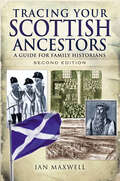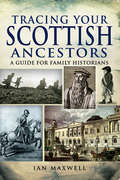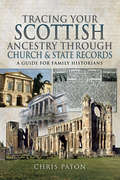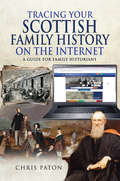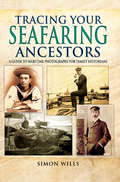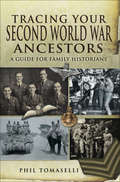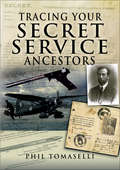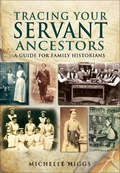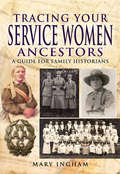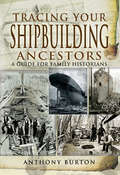- Table View
- List View
Tracing Your Northern Ancestors: A Guide to the North East & Cumbria for the Family Historian (Tracing Your Ancestors)
by Keith GregsonThe far north of England is a key site for family historians. Many researchers, seeking to trace their ancestry back through the generations, will find their trail leads to the north or through it. And yet, despite the burgeoning interest in genealogy and the importance of the region in so many life stories, no previous book has provided a guide to the documents and records that family historians can use in their search. In this accessible and informative introduction to the subject, Keith Gregson looks at the history and heritage of the region - of Northumberland, Tyneside, Durham, Wearside, Tees Valley and Cumbria - and gives a fascinating insight into the world in which our ancestors lived. He introduces the reader to the variety of records that are available for genealogical research, from legal and ecclesiastical archives, birth and death certificates to the records of local government, employers, institutions, clubs, societies and schools.
Tracing Your Northern Irish Ancestors: A Guide for Family Historians (Tracing Your Ancestors)
by Ian MaxwellTracing Your Northern Irish Ancestors is an expert introduction for the family historian to the wealth of material available to researchers in archives throughout Northern Ireland. Many records, like the early twentieth-century census returns and school registers, will be familiar to researchers, but others are often overlooked by all but the most experienced of genealogists. An easy-to-use, informative guide to the comprehensive collections available at the Public Record Office of Northern Ireland is a key feature of Ian Maxwells handbook. He also takes the reader through the records held in many libraries, museums and heritage centers across the province, and he provides detailed coverage of records that are available online. Unlike the rest of the British Isles, which has very extensive civil and census records, Irish ancestral research is hampered by the destruction of many of the major collections. Yet Ian Maxwell shows how family historians can make good use of church records, school registers and land and valuation records to trace their roots to the beginning of the nineteenth century and beyond.
Tracing Your Northern Irish Ancestors: A Guide for Family Historians (Tracing Your Ancestors)
by Ian MaxwellThe second edition of Tracing Your Northern Irish Ancestors is an expert introduction for the family historian to the wealth of material available to researchers in archives throughout Northern Ireland. Many records, like the early twentieth-century census returns and school registers, will be familiar to researchers, but others are often overlooked by all but the most experienced of genealogists. An easy-to-use, informative guide to the comprehensive collections available at the Public Record Office of Northern Ireland is a key feature of Ian Maxwells handbook. He also takes the reader through the records held in many libraries, museums and heritage centres across the province, and he provides detailed coverage of records that are available online. Unlike the rest of the British Isles, which has very extensive civil and census records, Irish ancestral research is hampered by the destruction of many of the major collections. Yet Ian Maxwell shows how family historians can make good use of church records, school registers and land and valuation records to trace their roots to the beginning of the nineteenth century and beyond.
Tracing Your Pauper Ancestors: A Guide for Family Historians (Tracing Your Ancestors)
by Robert BurlisonMany family historians will come across direct links to ancestors who were affected by poverty. Yet despite the burgeoning interest in genealogy, the history of pauperism and of poor relief has rarely been written about, and no previous book has provided a guide to documents and records that family researchers can use to their trace their pauper ancestors. In this accessible and informative introduction, Robert Burlison gives a vivid account of poverty and the poor. He identifies relevant records, indicates where they can be found, and offers essential advice on how this information can be used to piece together the lives of distant and not so distant relatives.
Tracing Your Personal Heritage: A Guide for Family Historians
by Nick BarrattFamily history is only one part of your personal heritage - there's more to your background than who your ancestors were. This differs from most books on the market as it places this process on an equal footing with the social history that surrounds each generation, as much as the technical know-how on which records to examine, and where. This book takes you on a unique journey back in time, examining the houses, streets, communities and ways of life that shaped the world around us, and in particular the precise circumstances that made us who we are today. Furthermore, this book will not just explain how and where to undertake this personal detective process - it shows you how to organise and shape your findings, and create your own personal archive using the latest technology and online resources, and how to add your store of knowledge to the emerging social networks that allow us to create a People's Archive and tell the forgotten story of the past that never makes it into the textbooks.
Tracing Your Police Ancestors (Tracing Your Ancestors)
by Stephen WadeTracing Your Police Ancestors will help you locate and research officers who served in any of the police forces of England and Wales from the creation of the Metropolitan Police by Sir Robert Peel in 1829. Assuming that the reader has no prior knowledge of how or where to look for such information, Stephen Wade explains and describes the various archives and records and provides a discussion of other sources. Case studies are used to show how an individual officers career may be traced and understood from this research. He also explains the range of secondary sources open to the family or local historian, many of which offer a broader account of the social and cultural history of the British police forces.
Tracing Your Poor Ancestors: A Guide for Family Historians (Tracing Your Ancestors)
by Stuart A. Raymond“Provides a wealth of information about . . . people who have gone through debt collectives, hospitals, bankruptcy, crime, homelessness—the list is huge.” —UK HistorianMany people in the past—perhaps a majority—were poor. Tracing our ancestors amongst them involves consulting a wide range of sources. Stuart Raymond’s handbook is the ideal guide to them. He examines the history of the poor and how they survived. Some were supported by charity. A few were lucky enough to live in an almshouse. Many had to depend on whatever the poor law overseers gave them. Others were forced into the Union workhouse. Some turned to a life of crime. Vagrants were whipped and poor children were apprenticed by the overseers or by a charity. Paupers living in the wrong place were forcibly “removed” to their parish of settlement. Many parishes and charities offered them the chance to emigrate to North America or Australia. As a result, there are many places where information can be found about the poor. Stuart Raymond describes them all: the records of charities, of the poor law overseers, of poor law unions, of Quarter Sessions, of bankruptcy, and of friendly societies. He suggests many other potential sources of information in record offices, libraries, and on the internet.“Packed with incredibly useful reference information which no family historian should be without.” —The Essex Family Historian
Tracing Your Potteries Ancestors: A Guide for Family & Local Historians (Tracing Your Ancestors)
by Michael SharpeAn easy-to-use reference for those looking to trace English ancestry connected to the North Staffordshire pottery industry. Tracing Your Potteries Ancestors introduces readers to the wealth of information available to those wishing to trace their North Staffordshire roots. Michael Sharpe gives a fascinating insight into the history of this part of the Midlands, which was for so long dominated by the pottery industry. The six pottery towns—Tunstall, Burslem, Hanley, Stoke, Fenton, and Longton—are at the heart of the story. His handbook is an essential guide for anyone researching the life of an individual or family connected with the area, bringing together all the relevant local and national archives for the first time. In a series of short, information-packed chapters, it describes the lives and experiences of ordinary people in this most extraordinary of landscapes. It charts the transition of the Six Towns from scattered farming communities to a thriving industrial conurbation. The living conditions of the urban poor, health and welfare, the influence of religion and migration, education, leisure pursuits, and the traumatic experience of war are all explored, and the many different archives and sources that are open to family history researchers are explained. &“Impressively researched, expertly written, deftly organized and presented, Tracing Your Potteries Ancestors: A Guide for Family & Local Historians is an extraordinarily informative and thoroughly reader-friendly resource.&” —Midwest Book Review
Tracing Your Pre-Victorian Ancestors: A Guide to Research Methods for Family Historians (Tracing Your Ancestors)
by John WintripTracing Your Pre-Victorian Ancestors is the ideal handbook for family historians whose research has reached back to the early nineteenth century and are finding it difficult to go further. John Wintrip guides readers through all the steps they can take in order to delve even more deeply into the past. Carrying research through to earlier periods is more challenging because church registers recorded less information than civil registration records and little census data is available. Researchers often encounter obstacles they don't know how to overcome. But, as this book demonstrates, greater understanding of the sources and the specific records within them, along with a wider knowledge of the historical context, often allows progress to be made. Most important, John Wintrip concentrates on how to do the research on the practical steps that can be taken in order to break through these barriers. He looks at online services, archives and their catalogues, factors that can influence the outcome of research, wider family relationships, missing ancestors and mistaken identity. Throughout the book he emphasizes the process of research and the variety of resources and search tools that can be used.
Tracing Your Prisoner Ancestors: A Guide for Family Historians (Tracing Your Ancestors)
by Stephen WadeAn “excellent book . . . a great introduction to legal terms, offences, procedures, sentences, and much more besides” trom the author of Writing True Crime (Ripperologist).The history of the British prison system only had systematic records from the middle of the nineteenth century. Before that, material on prisoners in local jails and houses of correction was patchy and minimal. In more recent times, many prison records have been destroyed.In Tracing Your Prisoner Ancestors, crime historian Stephen Wade attempts to provide information and guidance to family and social history researchers in this difficult area of criminal records. His book covers the span of time from medieval to modern, and includes some Scottish and Irish sources.The sources explained range broadly from central calendars of prisoners, court records and jail returns, through to memoirs and periodicals. The chapters also include case studies and short biographies of some individuals who experienced our prisons and left some records.“All in all, it is a fascinating read, even if you don’t have prisoner ancestors! Wade has managed to explain the complexities of the criminal system, its records and how they affected our ancestors with his well-researched and illuminating guide.” —Family and Community Historical Research Society Newsletter “Overall, it provides an excellent starting point for family historians to investigate their relations who ended up behind bars.” —WDYTYA? Magazine
Tracing Your Prisoner of War Ancestors: The First World War (Tracing Your Ancestors)
by Sarah PatersonThe experience of civilian internees and British prisoners of war in German and Turkish hands during the First World War is one of the least well-known and least researched aspects of the history of the conflict. The same applies to prisoners of war and internees held in the UK. Yet, as Sarah Paterson shows in this authoritative handbook, a wide-range of detailed and revealing information is available if you know where to look for it.Briefly she outlines the course of the campaigns in which British servicemen were captured, and she describes how they were treated and the conditions they endured. She locates the camps they were taken to and explains how they were run. She also shows how this emotive and neglected subject can be researched - how archives and records can be used to track down individual prisoners and uncover something of the lives they led in captivity.Her work will be an essential introduction for readers who are keen to get an insight into the experience of a POW or an internee during the First World War, and it will be an invaluable guide for anyone who is trying to trace an ancestor who was captured.
Tracing Your Railway Ancestors: A Guide for Family Historians (Tracing Your Ancestors)
by Di DrummondDi Drummond's concise and informative guide to Britain's railways will be absorbing reading for anyone who wants to learn about the history of the industry and for family history researchers who want to find out about the careers of their railway ancestors. In a clear and accessible way she guides readers through the social, technical and economic aspects of the story. She describes in vivid detail the rapid growth, maturity and long decline of the railways from the earliest days in the late-eighteenth century to privatization in the 1990s. In the process she covers the themes and issues that family historians, local historians and railway enthusiasts will need to understand in order to pursue their research. A sequence of short, fact-filled chapters gives an all-round view of the development of the railwaysIn addition to tracing the birth and growth of the original railway companies, she portrays the types of work that railwaymen did and pays particular attention to the railway world in which they spent their working lives. The tasks they undertook, the special skills they had to learn, the conditions they worked in, the organization and hierarchy of the railway companies, and the make-up of railway unions - all these elements in the history of the railways are covered. She also introduces the reader to the variety of records that are available for genealogical research - staff records and registers, publications, census returns, biographies and autobiographies, and the rest of the extensive literature devoted to the railway industry.
Tracing Your Royal Marine Ancestors: A Guide for Family Historians (Tracing Your Ancestors)
by Richard Brooks Matthew LittleWhether you are interested in the career of an individual Royal Marine or just want to know more about the part played by the Marines in a particular battle or campaign, this book will point you in the right direction. Assuming that the reader has no prior knowledge of the Royal Marines, their history or organization, Richard Brooks and Matthew Little explain which records survive, where they can be found and how they can help you in your research. They also describe in vivid detail the evolution of the Royal Marines, from the tentative beginnings of the service in the seventeenth century to their present position as a key part of the British armed forces.
Tracing Your Rural Ancestors: A Guide For Family Historians (Tracing Your Ancestors)
by Jonathan BrownMany family historians will come across direct links to ancestors who lived and worked in the countryside as farmers, laborers, landowners, village tradesmen and professionals for most of us have rural ancestors. Yet despite the burgeoning interest in genealogy, these people have rarely been written about with the family historian in mind. No previous book has provided a guide to the documents and records, from medieval times to the twentieth century, that researchers can use to find out about their rural ancestors and the world in which they lived. That is why this accessible and informative introduction by rural historian Jonathan Brown is so important.He describes the make-up of country and village society - the farmers, large and small, the farm-workers, the landowners and estate-owners, and the local business people, the tradesmen and merchants. At the same time he identifies and discusses the relevant national and local records, indicates where they can be found, and offers essential advice on how this information can be used to piece together the lives of distant and not so distant relatives. Tracing Your Rural Ancestors is essential reading for anyone who is looking for an insight into the history of rural life, work and society.
Tracing Your Scottish Ancestors: A Guide for Family Historians (Tracing Your Ancestors Ser.)
by Ian MaxwellThe fully revised second edition of the genealogy resource praised as &“a great starting point for anyone who has an interest in their Scottish roots&” (Scottish Field). This lively and accessible introduction to Scotland&’s long, complex and fascinating story is aimed primarily at family historians who are eager to explore and understand the world in which their ancestors lived. Ian Maxwell guides readers through the wealth of material available to researchers in Scotland and abroad. He looks at every aspect of Scottish history and at all the relevant resources. As well as covering records held at the National Archives of Scotland, he examines closely the information held at local archives throughout the country. He also describes the extensive Scottish records that are now available on line. His expert and up-to-date survey is a valuable handbook for anyone who is researching Scottish history because he explains how the archive material can be used and where it can be found. For family historians, it is essential reading as it puts their research into a historical perspective, giving them a better insight into the part their ancestors played in the past. &“The historical section provides a lively summary of the social history of Scotland, nicely illustrated from contemporary accounts and nineteenth-century line drawings . . . A high-level reminder of most of the invaluable but challenging accumulation of Scottish online resources.&” —The Friends of the National Archives
Tracing Your Scottish Ancestors: A Guide for Family Historians (Tracing Your Ancestors)
by Ian MaxwellScotlands history has been influenced by many factors the division between the Highlands and the Lowlands, the feudal system, the Reformation, the industrial revolution - that have shaped the countrys past and impacted on the lives of its people. Tracing Your Scottish Ancestors is a lively and accessible introduction to this long, complex and fascinating story. It is aimed primarily at family historians who are eager to explore and understand the world in which their ancestors lived. Ian Maxwell guides readers through the wealth of material available to researchers in Scotland and abroad. He looks at every aspect of Scottish history and at all the relevant resources.In addition to covering records held at the National Archives of Scotland, he examines closely the information held at local archives throughout the country. He also describes the extensive Scottish records that are now available online. His expert survey will be essential reading for anyone who is researching Scottish history, for he explains how the archive material can be used and where it can be found. This pioneering book breaks new ground in that it offers a detailed social history showing how the lives of our ancestors changed over the centuries and how this is reflected in the documentation that has survived. It will help family historians put their research in historical perspective, giving them a better insight into the part their ancestors played in the past.
Tracing Your Scottish Ancestry through Church and State Records: A Guide for Family Historians (A\guide For Family Historians Ser.)
by Chris Paton&“The ideal instructional guide and reference for anyone doing genealogical research&” by the author of Tracing Your Scottish Family History on the Internet (Midwest Book Review). Despite its Union with England and Wales in 1707, Scotland remained virtually independent from its partners in many ways, retaining its own legal system, its own state church, and its own education system. In Tracing Scottish Ancestry Through Church and State Records, genealogist Chris Paton examines the most common records used by family historians in Scotland, ranging from the vital records kept by the state and the various churches, the decennial censuses, tax records, registers of land ownership and inheritance, and records of law and order. Through precepts of clare constat and ultimus haeres records, feudalism and udal tenure, to irregular marriages, penny weddings and records of sequestration, Chris Paton expertly explores the unique concepts and language within many Scottish records that are simply not found elsewhere within the British Isles. He details their purpose and the information recorded, the legal basis by which they were created, and where to find them both online and within Scotland&’s many archives and institutions. &“A useful and very readable introduction to Scottish records, with many case studies to assist the reader, but there is also much in it that may be new to more experienced family historians.&” —The Local Historian, journal of the British Association for Local History &“Leads the reader through the Scottish record jungle.&” —Canada&’s Anglo-Celtic Connections
Tracing Your Scottish Ancestry through Church and State Records: A Guide for Family Historians (Tracing Your Ancestors Ser.)
by Chris Paton&“The ideal instructional guide and reference for anyone doing genealogical research&” by the author of Tracing Your Scottish Family History on the Internet (Midwest Book Review). Despite its Union with England and Wales in 1707, Scotland remained virtually independent from its partners in many ways, retaining its own legal system, its own state church, and its own education system. In Tracing Scottish Ancestry Through Church and State Records, genealogist Chris Paton examines the most common records used by family historians in Scotland, ranging from the vital records kept by the state and the various churches, the decennial censuses, tax records, registers of land ownership and inheritance, and records of law and order. Through precepts of clare constat and ultimus haeres records, feudalism and udal tenure, to irregular marriages, penny weddings and records of sequestration, Chris Paton expertly explores the unique concepts and language within many Scottish records that are simply not found elsewhere within the British Isles. He details their purpose and the information recorded, the legal basis by which they were created, and where to find them both online and within Scotland&’s many archives and institutions. &“A useful and very readable introduction to Scottish records, with many case studies to assist the reader, but there is also much in it that may be new to more experienced family historians.&” —The Local Historian, journal of the British Association for Local History &“Leads the reader through the Scottish record jungle.&” —Canada&’s Anglo-Celtic Connections
Tracing Your Scottish Family History on the Internet: A Guide for Family Historians (Tracing Your Ancestors)
by Chris PatonFrom search engines and databases to DNA platforms, discover how to easily learn more about your Scottish ancestry online with this helpful guide.Scotland is a land with a proud and centuries long history that far predates its membership of Great Britain and the United Kingdom. Today in the 21st century it is also a land that has done much to make its historical records accessible, to help those with Caledonian ancestry trace their roots back to earlier times and a world long past.In Tracing Scottish Family History on the Internet, Chris Paton expertly guides the family historian through the many Scottish records offerings available, but also cautions the reader that not every record is online, providing detailed advice on how to use web based finding aids to locate further material across the country and beyond. He also examines social networking and the many DNA platforms that are currently further revolutionizing online Scottish research.From the Scottish Government websites offering access to our most important national records, to the holdings of local archives, libraries, family history societies, and online vendors, Chris Paton takes the reader across Scotland, from the Highlands and Islands, through the Central Belt and the Lowlands, and across the diaspora, to explore the various flavors of Scottishness that have bound us together as a nation for so long.
Tracing Your Seafaring Ancestors: A Guide to Maritime Photographs for Family Historians (Tracing Your Ancestors)
by Simon WillsPhotographs of your seafaring ancestors may tell you more about their lives than you realize, and Simon Willss helpful and practical guide shows you how to identify and interpret the evidence caught on camera. Since maritime roles have been so vital to Britains prosperity and military might, they are among the commonest professions depicted in photographs of our ancestors, and his handbook is the ideal introduction to them.Maybe your ancestor was a seaman in the Royal Navy, a ships captain, a steward on an ocean liner, or an officer in the naval reserves? This book shows you how to spot photographic clues to an individuals career. Whether your ancestor served in the merchant navy or the Royal Navy or in another seagoing role such as a fisherman, a lifeboatman, or even a ships passenger, Simon Willss book will be your guide.
Tracing Your Second World War Ancestors (Tracing Your Ancestors)
by Phil TomaselliThe Second World War was the defining conflict of the twentieth century and it is one of the most popular and fascinating areas for historical research and for family historians. More records than ever are available to researchers whose relatives served during the war. And this new book by Phil Tomaselli is the perfect guide to how to locate and understand these sources and get the most out of them. He explains how, and from where, service records can be obtained, using real examples showing what they look like and how to interpret them. He also examines records of the military units relatives might have served in so their careers can be followed in graphic detail. The three armed services are covered, along with the merchant navy, the Home Guard, civilian services, prisoners of war, gallantry and campaign medals, casualties, womens services and obscure wartime organizations. Also included are a glossary of service acronyms, information on useful websites, an introduction to the National Archives and details of other useful sources.
Tracing Your Secret Service Ancestors (Tracing Your Ancestors)
by Phil TomaselliDid you have a spy in the family, an ancestor who was involved in espionage at home or abroad? If you have ever had any suspicions about the secret activities of your relatives, or are curious about the long hidden history of Britain's secret services and those who served in them, this is the book for you. Phil Tomaselli's fascinating guide to over 200 years of British spies and spying takes the reader on a journey through the twilight world of the secret intelligence organizations Britain has run since the time of the French Revolution to the modern day, and it shows where their records can be found.
Tracing Your Servant Ancestors (Tracing Your Ancestors)
by Michelle HiggsWhile there are popular and academic books on servants and domestic service, as well as television dramas and documentaries, little attention has been paid to the sources family historians can use to explore the lives and careers of their servant ancestors. Michelle Higgss accessible and authoritative handbook has been written to serve just this purpose.Covering the period from the eighteenth century through to the Second World War, her survey gives a fascinating insight into the conditions of domestic service and the experience of those who worked within it. She quotes examples from the sources to show exactly how they can be used to trace individuals. Chapters cover the historical background of domestic service; the employers; the social hierarchy within the servant class; and the recruitment and responsibilities of servants.A comprehensive account of the available sources the census, wills, directories, household accounts, tax and union records, diaries and online sources - provides readers with all the information they need to do their own research. This short, vivid overview will be invaluable to anyone keen to gain a practical understanding of the realities of servants lives.
Tracing Your Service Women Ancestors: A Guide for Family Historians (Tracing Your Ancestors)
by Mary InghamWhether you are interested in the career of an individual service woman or just want to know more about the part played by service women in a particular war or campaign, this is the book for you. Assuming that the reader has no prior knowledge of service women, Mary Ingham explains which records survive, where they can be found and how they can help in your research. She also vividly describes the role of women with the armed services from the Crimean War of the 1850s to the aftermath of the First World War and offers an insight into what the records can tell you about the career of an ancestor who served at home or abroad. From the army schoolmistresses to the Womens Land Army, her account outlines the history of each service, describes uniforms and gives examples of daily life and likely experiences. This is the book you need if you want to follow up those clues in your familys history stories heard from older relatives, pictures in family photograph albums, handed-down uniforms, badges or medals that seem to indicate that one of your women ancestors served in wartime.
Tracing Your Shipbuilding Ancestors: A Guide For Family Historians (Tracing Your Ancestors)
by Anthony BurtonAnthony Burton's concise and informative guide to British shipbuilding will be absorbing reading for anyone who wants to learn about its history or find out about the life of a shipbuilder and his family. In a clear and accessible way he traces its development from the medieval period to its peak in the nineteenth and early twentieth centuries and on into the present day. He describes how, at the height of its powers, it was of immense importance. It employed tens of thousands of workers, so a large proportion of the population today has some connection with it. And this great industry was also so widespread that wherever you move around the coast of Britain, you will never be far from a former shipbuilding center.This practical handbook will be an invaluable guide for family and local historians and for readers with a more general interest in shipbuilding. It introduces the variety of national and local records that are available for genealogical research and considers the many other resources that can yield fascinating information about the industry and those who worked in it.
